Abstract
The ability of human choriogonadotropin (hCG) to regulate its receptors and target cell responses has been studied in a clonal strain of cultured Leydig tumor cells (MA-10). Exposure of the MA-10 cells to hCG results in decrease in hCG binding activity which is dependent on time and the concentration of hCG. This decrease is due to a change in the number of receptors rather than in the affinity of the receptors, and it is accompanied by a corresponding reduction in the ability of hCG to stimulate steroidogenesis. Exposure of the MA-10 cells to hCG also resulted in a reduction of the steroidogenic responses to cholera toxin and 8-Br-adenosine cyclic 3',5'-monophosphate. The hCG-induced loss of steroidogenic responses to these stimuli seems to be due to the stimulation of steroidogenesis rather than to the decrease in hCG receptors because it also can be induced when steroidogenesis is stimulated with cholera toxin or 8-Br-adenosine 3',5'-monophosphate under conditions such that the number of hCG receptors is not reduced.
Full text
PDF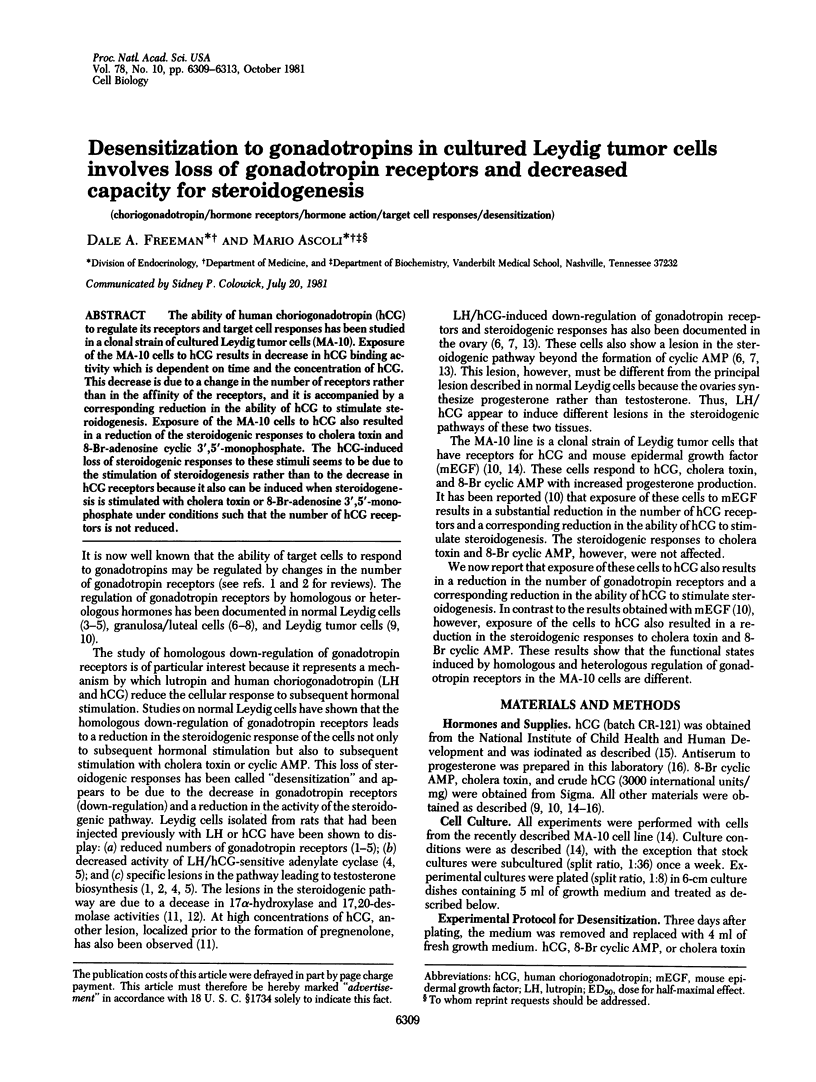
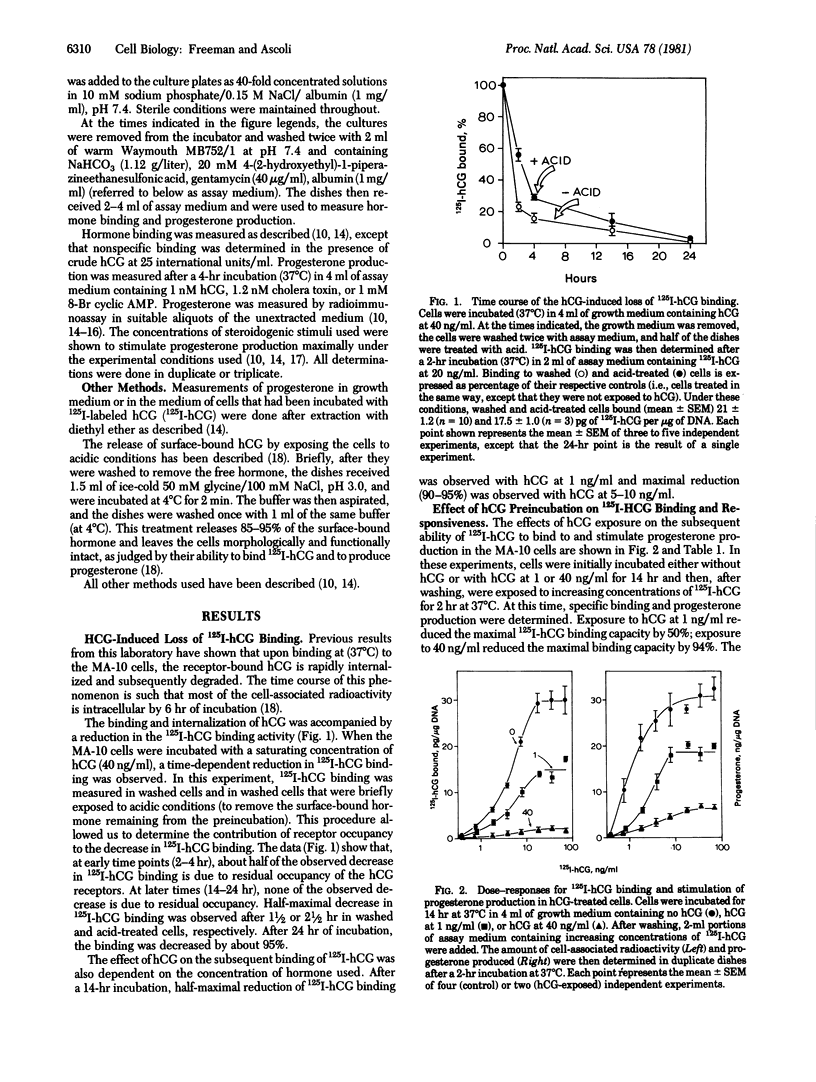
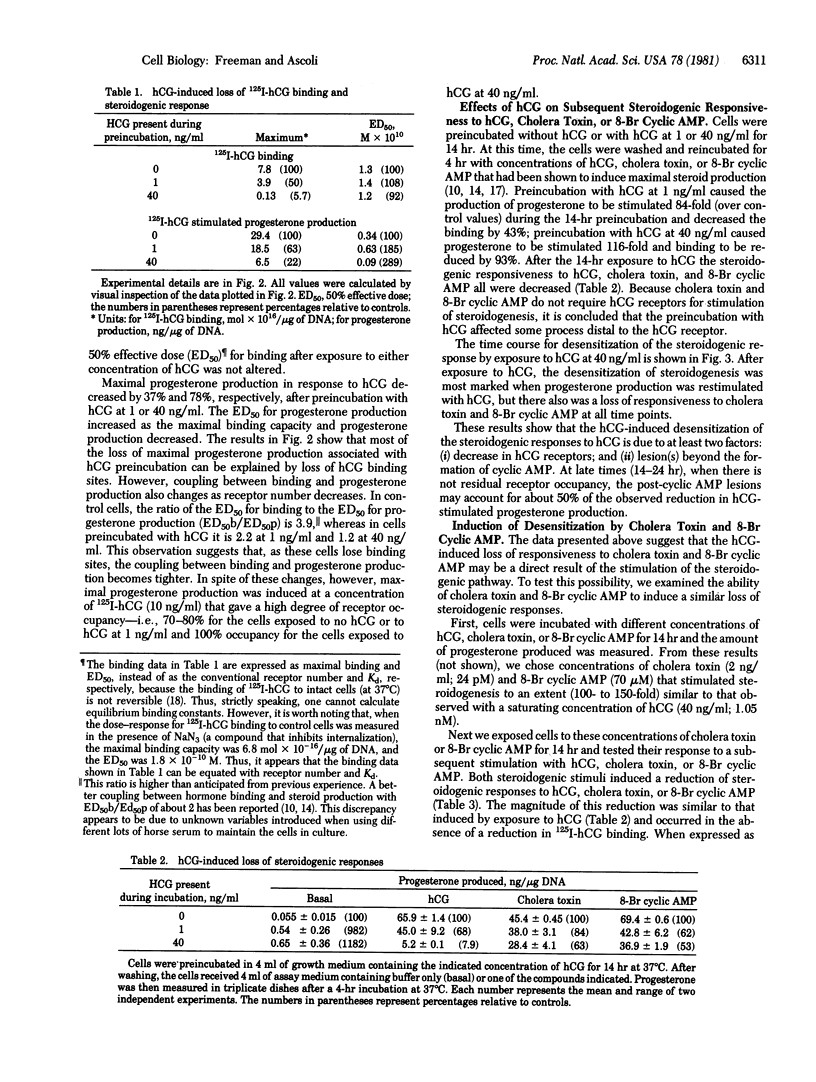
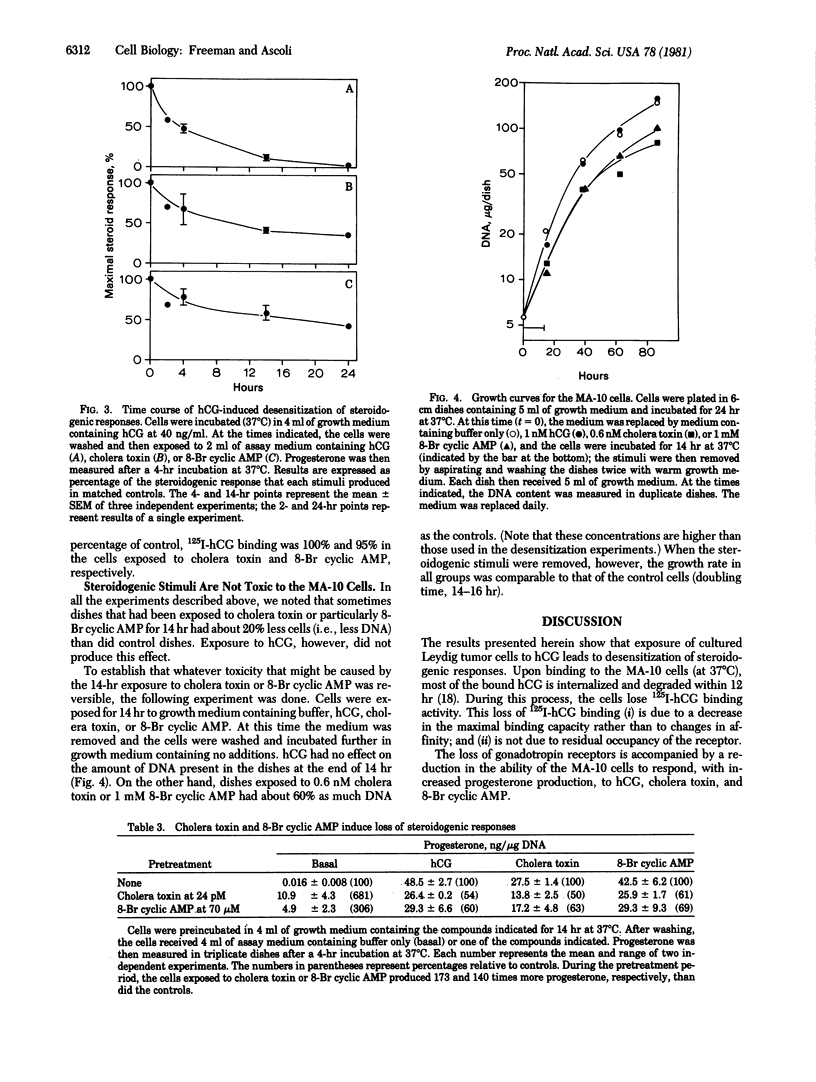
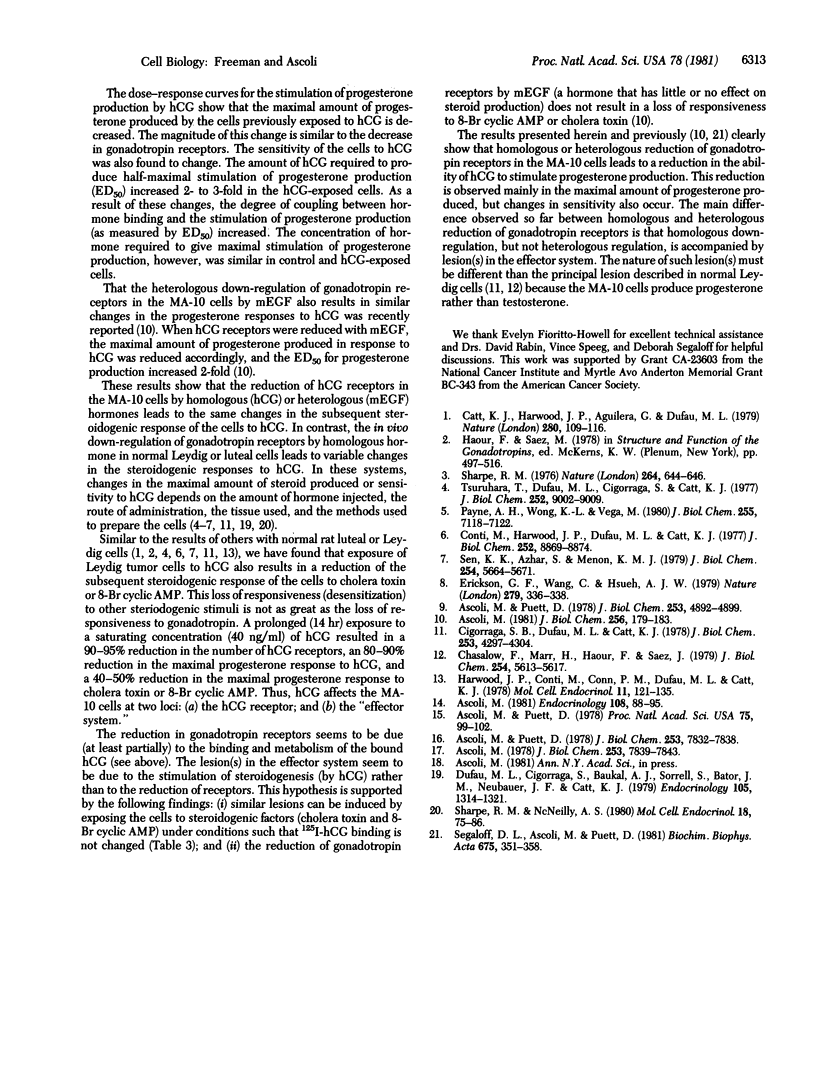
Selected References
These references are in PubMed. This may not be the complete list of references from this article.
- Ascoli M. Characterization of several clonal lines of cultured Leydig tumor cells: gonadotropin receptors and steroidogenic responses. Endocrinology. 1981 Jan;108(1):88–95. doi: 10.1210/endo-108-1-88. [DOI] [PubMed] [Google Scholar]
- Ascoli M. Demonstration of a direct effect of inhibitors of the degradation of receptor-bound human choriogonadotropin on the steroidogenic pathway. J Biol Chem. 1978 Nov 10;253(21):7839–7843. [PubMed] [Google Scholar]
- Ascoli M., Puett D. Degradation of receptor-bound human choriogonadotropin by murine Leydig tumor cells. J Biol Chem. 1978 Jul 25;253(14):4892–4899. [PubMed] [Google Scholar]
- Ascoli M., Puett D. Gonadotropin binding and stimulation of steroidogenesis in Leydig tumor cells. Proc Natl Acad Sci U S A. 1978 Jan;75(1):99–102. doi: 10.1073/pnas.75.1.99. [DOI] [PMC free article] [PubMed] [Google Scholar]
- Ascoli M., Puett D. Inhibition of the degradation of receptor-bound human choriogonadotropin by lysosomotropic agents, protease inhibitors, and metabolic inhibitors. J Biol Chem. 1978 Nov 10;253(21):7832–7838. [PubMed] [Google Scholar]
- Ascoli M. Regulation of gonadotropin receptors and gonadotropin responses in a clonal strain of Leydig tumor cells by epidermal growth factor. J Biol Chem. 1981 Jan 10;256(1):179–183. [PubMed] [Google Scholar]
- Catt K. J., Harwood J. P., Aguilera G., Dufau M. L. Hormonal regulation of peptide receptors and target cell responses. Nature. 1979 Jul 12;280(5718):109–116. doi: 10.1038/280109a0. [DOI] [PubMed] [Google Scholar]
- Chasalow F., Marr H., Haour F., Saez J. M. Testicular steroidogenesis after human chorionic gonadotropin desensitization in rats. J Biol Chem. 1979 Jul 10;254(13):5613–5617. [PubMed] [Google Scholar]
- Cigorraga S. B., Dufau M. L., Catt K. J. Regulation of luteinizing hormone receptors and steroidogenesis in gonadotropin-desensitized leydig cells. J Biol Chem. 1978 Jun 25;253(12):4297–4304. [PubMed] [Google Scholar]
- Conti M., Harwood J. P., Dufau M. L., Catt K. J. Effect of gonadotropin-induced receptor regulation on biological responses of isolated rat luteal cells. J Biol Chem. 1977 Dec 25;252(24):8869–8874. [PubMed] [Google Scholar]
- Dufau M. L., Cigorraga S., Baukal A. J., Sorrell S., Bator J. M., Neubauer J. F., Catt K. J. Androgen biosynthesis in Leydig cells after testicular desensitization by luteinizing hormone-releasing hormone and human chorionic gonadotropin. Endocrinology. 1979 Dec;105(6):1314–1321. doi: 10.1210/endo-105-6-1314. [DOI] [PubMed] [Google Scholar]
- Erickson G. F., Wang C., Hsueh A. J. FSH induction of functional LH receptors in granulosa cells cultured in a chemically defined medium. Nature. 1979 May 24;279(5711):336–338. doi: 10.1038/279336a0. [DOI] [PubMed] [Google Scholar]
- Harwood J. P., Conti M., Conn P. M., Dufau M. L., Catt K. J. Receptor regulation and target cell responses: studies in the ovarian luteal cell. Mol Cell Endocrinol. 1978 Jul-Aug;11(2):121–135. doi: 10.1016/0303-7207(78)90001-1. [DOI] [PubMed] [Google Scholar]
- Payne A. H., Wong K. L., Vega M. M. Differential effects of single and repeated administrations of gonadotropins on luteinizing hormone receptors and testosterone synthesis in two populations of Leydig cells. J Biol Chem. 1980 Aug 10;255(15):7118–7122. [PubMed] [Google Scholar]
- Segaloff D. L., Ascoli M., Puett D. Characterization of the desensitized state of Leydig tumor cells. Biochim Biophys Acta. 1981 Jul 17;675(3-4):351–358. doi: 10.1016/0304-4165(81)90025-8. [DOI] [PubMed] [Google Scholar]
- Sen K. K., Azhar S., Menon K. M. Receptor-mediated gonadotropin action in the ovary. Desensitization of gonadotropin binding sites, activation of adenosine 3':5'-cyclic monophosphate-dependent protein kinase(s), and regulation of steroidogenesis in rat ovary. J Biol Chem. 1979 Jul 10;254(13):5664–5671. [PubMed] [Google Scholar]
- Sharpe R. M., McNeilly A. S. Differences between dispersed Leydig cells and intact testes in their sensitivity to gonadotrophin-stimulation in vitro after alteration of LH-receptor numbers. Mol Cell Endocrinol. 1980 May;18(2):75–86. doi: 10.1016/0303-7207(80)90083-0. [DOI] [PubMed] [Google Scholar]
- Sharpe R. M. hCG-induced decrease in availability of rat testis receptors. Nature. 1976 Dec 16;264(5587):644–646. doi: 10.1038/264644a0. [DOI] [PubMed] [Google Scholar]
- Tsuruhara T., Dufau M. L., Cigorraga S., Catt K. J. Hormonal regulation of testicular luteinizing hormone receptors. Effects on cyclic AMP and testosterone responses in isolated Leydig cells. J Biol Chem. 1977 Dec 25;252(24):9002–9009. [PubMed] [Google Scholar]



